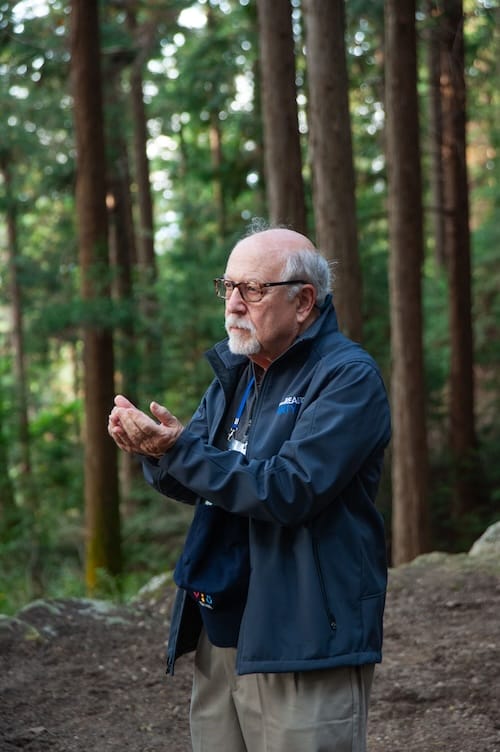Dr. Tamberly Conway: A Trailblazer in Nature-Based Wellness
Dr. Tamberly Conway, Founder and CEO of Conservation Conexions and Nurturing Nature Lifelong Living, is revolutionizing the way we perceive health and well-being. With a background in the U.S. Forest Service and extensive expertise in nature and forest therapy, Dr. Conway is committed to bridging the gap between conservation, corporate wellness, and eldercare. Her work is deeply rooted in personal experience—after witnessing the transformative effects of nature therapy on her father, who battled Alzheimer’s, she became an advocate for integrating nature into health and wellness strategies. Today, she champions “Nature Dosing,” a holistic approach that combines internal nourishment through nutrition with external rejuvenation via intentional nature connection.
“Nature is more than just a place to visit—it’s a powerful tool for healing, resilience, and innovation,” Dr. Conway explains. “Through my work in nature-based wellness, urban conservation, and eldercare support, I help people and businesses reconnect with nature for better health, productivity, and sustainability.”
The Growing Crisis of Aging and Isolation
As the aging population expands, many seniors find themselves facing loneliness, depression, and disconnection. Some lack close family support, while others struggle with decisions about their future care. Eldercare facilities and caregivers are often overwhelmed, leading to burnout and emotional exhaustion. Dr. Conway recognizes this crisis and emphasizes the importance of planning ahead to create a supportive, engaging environment for aging individuals. “As we encounter our aging loved ones, the better prepared we are for that transition, the more positive and fulfilling their experience will be,” she notes.
She also stresses the significance of integrating nature into eldercare settings. “Nature has the power to reduce feelings of loneliness and isolation. Even small moments—sitting in the sun, hearing birdsong, or feeling the breeze—can help seniors feel connected and engaged.”
The Science Behind Nature Therapy
Decades of research affirm the physical, emotional, and cognitive benefits of nature exposure. Studies indicate that spending at least 120 minutes per week in nature can significantly lower cortisol levels, reduce anxiety and depression, and improve cognitive function. For seniors, even brief interactions with nature—such as sitting in a garden, feeling the breeze, or listening to birds—can reduce feelings of isolation and promote a sense of connection.
“We don’t have to escape to a park or a forest to get the benefits of nature,” Dr. Conway says. “Nearby nature—like stepping outside, sitting on a porch, or even bringing plants indoors—can have incredible health benefits.”
Nature therapy also fosters resilience in caregivers by alleviating stress and preventing burnout. Through initiatives like NatureDose tracking, Dr. Conway helps individuals and organizations measure their time in nature, reinforcing the importance of consistent engagement with the natural world.
Transforming Eldercare with Nature-Based Solutions
Dr. Conway’s approach to eldercare goes beyond traditional medical and pharmaceutical interventions. By integrating nature into daily routines, eldercare facilities can enhance both physical and emotional well-being. Simple actions, such as incorporating biophilic design indoors, creating accessible outdoor spaces, and encouraging sensory interactions with plants and soil, can lead to remarkable improvements in mood and cognitive function.
“Studies show that exposure to certain aromas found in nature can enhance memory recall,” she explains. “This is especially beneficial for individuals with dementia or Alzheimer’s, as familiar scents can bring back cherished memories and foster meaningful conversations.”
Bringing Nature into Corporate Wellness
Beyond eldercare, Dr. Conway is also reshaping corporate wellness strategies by advocating for nature-based interventions in the workplace. Employee burnout, stress, and mental fatigue are at all-time highs, but integrating nature into office environments can boost productivity, creativity, and overall well-being.
“Burnout and stress are at an all-time high, but science proves that nature isn’t just a luxury—it’s a necessity for mental clarity, emotional resilience, and physical health,” she states.
Whether through outdoor walking meetings, designated green spaces for relaxation, or simply encouraging employees to take brief nature breaks, businesses can foster a healthier, more engaged workforce. In South Korea, companies have adopted nature therapy retreats, where employees spend several days immersed in forest environments, leading to measurable improvements in mental clarity and stress reduction. Dr. Conway believes the U.S. can benefit from similar initiatives to create a more sustainable and wellness-focused corporate culture.
A Call to Action: Embracing Nature for a Healthier Future
Dr. Conway’s work is more than just a business innovation—it’s a movement toward a more sustainable and resilient future. She urges business leaders, caregivers, and communities to recognize nature as a powerful yet underutilized resource for health and well-being. Her mission is clear: to inspire a shift in mindset, encouraging individuals to embrace nature as an essential part of their daily lives.
“If you’re a business leader looking to boost employee well-being, a caregiver seeking ways to reduce burnout, or a community invested in creating meaningful spaces for our elder loved ones, let’s connect,” she says. “Nature is the greatest untapped resource we have for building resilience—and I’m here to help you harness it.”
For those interested in learning more, Dr. Conway’s documentary on South Korea’s forest therapy initiatives serves as a compelling model for how nature can transform eldercare and healthcare systems worldwide. By harnessing the healing power of nature, we can create a more compassionate, vibrant, and connected society.
The Editorial Team at Healthcare Business Today is made up of experienced healthcare writers and editors, led by managing editor Daniel Casciato, who has over 25 years of experience in healthcare journalism. Since 1998, our team has delivered trusted, high-quality health and wellness content across numerous platforms.
Disclaimer: The content on this site is for general informational purposes only and is not intended as medical, legal, or financial advice. No content published here should be construed as a substitute for professional advice, diagnosis, or treatment. Always consult with a qualified healthcare or legal professional regarding your specific needs.
See our full disclaimer for more details.








